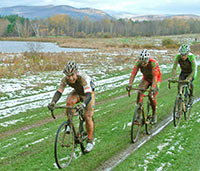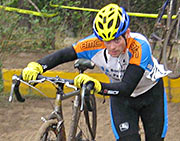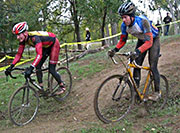Should You Race Cyclocross?
 Should you race cyclocross?
Should you race cyclocross?
By Joe Friel
If you’re like many riders, you were burned out by June this year. After some time off the bike and a few group rides you probably finished the year with a couple of criteriums and now you’re ready to go again. In fact, you’re thinking about doing some cyclocross races. Your timing is just right since the cross season is in full swing in many places.
When I hear of riders being toast by June, I wonder why. How come they couldn’t make it through the entire road or mountain bike season like other athletes? I believe the answer is that they rode too intensely too early in the season. In fact, cyclocross may even be part of that problem for these riders.
Cross and Burnout?
 How could cross lead to burnout? Every time you go to a race or do an anaerobic workout there is a certain amount of physical and psychological stress created. This stress causes the body’s many systems to work overtime, especially the endocrine and sympathetic nervous systems which prepare the body for fight or flight. Together they get the body ready to face an artificial “crisis” such as a race or hard workout. These systems can handle only so many crises in a short period of time before they are exhausted. Some liken this to having just a few “matches” to burn in a season. Once they are all used up with races and very hard workouts extensive rest is needed to create more matches.
How could cross lead to burnout? Every time you go to a race or do an anaerobic workout there is a certain amount of physical and psychological stress created. This stress causes the body’s many systems to work overtime, especially the endocrine and sympathetic nervous systems which prepare the body for fight or flight. Together they get the body ready to face an artificial “crisis” such as a race or hard workout. These systems can handle only so many crises in a short period of time before they are exhausted. Some liken this to having just a few “matches” to burn in a season. Once they are all used up with races and very hard workouts extensive rest is needed to create more matches.
So it may just be that racing cross is what caused you to burnout by June since it is so highly anaerobic and stressful. A few athletes are able to handle all of this anaerobic effort year round without frying. They are the exception rather than the rule, however.
Cross and Spring Fitness
Will doing cross races make you more fit for road racing and mountain biking? If you have an important, road or mountain bike race planned for January, then cross is a great way to prepare. Your anaerobic function will be peaked and ready to go. But if your first important event isn’t until spring, the anaerobic fitness gained from cross will be long gone, or you will be totally spent trying to maintain it (in other words, more burned matches).
 Following a stressful cross season, especially one that started immediately following a long road or mountain bike season, most riders need a break from training. During this break any fitness gained from cross will soon disappear. And since there is a need to rebuild fitness from the ground up, it will take a minimum of 14 weeks to come to a full race peak again. Assuming the month of January was spent as R&R, that puts you at mid May for the first important race of the new year—at the earliest. Some riders need more time than this to prepare for a peak of fitness putting the first peak in June or even July. Of course, you could go straight from cross to road or mountain bike racing and training, but that’s a surefire way to again be toast by June.
Following a stressful cross season, especially one that started immediately following a long road or mountain bike season, most riders need a break from training. During this break any fitness gained from cross will soon disappear. And since there is a need to rebuild fitness from the ground up, it will take a minimum of 14 weeks to come to a full race peak again. Assuming the month of January was spent as R&R, that puts you at mid May for the first important race of the new year—at the earliest. Some riders need more time than this to prepare for a peak of fitness putting the first peak in June or even July. Of course, you could go straight from cross to road or mountain bike racing and training, but that’s a surefire way to again be toast by June.
Cross Planning
Don’t get me wrong—cross has much to offer. It will improve your bike-handling skills, provide motivation for training, and is a lot of fun. These are great reasons to participate. Just don’t think that the anaerobic fitness gained in the fall is still going to be there in the spring. If it is, you’re a candidate for a short summer season.
This doesn’t mean you shouldn’t do cross races, only that some careful thought should go into the process of planning a year of racing. All events you plan to enter—including cross, road, and mountain bike—need to be considered your “race schedule.” These races should then be prioritized into A, B, and C categories. Since I’m cautious of trying to balance fitness with burnout, I limit the riders I train to three or four A-priorities in a season and eight to 12 B-priority races. The rest are the low-priority C kind. Let’s look at how this planning scheme helps with the cross racing decision.
 If one or more cross races is on the A-priority list then you must build to a fall peak as you would any other important race by following a periodization plan. Then take a break of one to four weeks following the last cross race before returning to base training. Base work would typically be at least six weeks and as much as 12 weeks. How long depends on the extent of your aerobic, strength, muscular-endurance fitness. Baseline testing with follow-ups, or even a long, early season race or group ride, will tell you if you need more base training development.
If one or more cross races is on the A-priority list then you must build to a fall peak as you would any other important race by following a periodization plan. Then take a break of one to four weeks following the last cross race before returning to base training. Base work would typically be at least six weeks and as much as 12 weeks. How long depends on the extent of your aerobic, strength, muscular-endurance fitness. Baseline testing with follow-ups, or even a long, early season race or group ride, will tell you if you need more base training development.
If you follow this route and decide to make some cross races A-priority, then training correctly for them is just as important as training for your other race season. In this case, I’d highly recommend reading Cyclo-Cross by Simon Burney (Velo Press, 1996) to learn how to develop the necessary fitness, and set-up your bike correctly.
If cross races are B-priority then there is no attempt to peak, but fitness still needs to be at a high level. Training in this case includes weekly cross-specific workouts mixed with your normal road- or mountain bike-specific base training. These cross workouts might be hill run-ups, mounting and dismounting drills, and off-road rides. But most of the training in the late fall months for the B-priority cross racer is focused on preparing for the upcoming road or mountain bike season. This means training aerobic fitness, seated hill strength, weight-room strength, pedaling and handling skills refinement, and a small amount of sub-lactate threshold riding. The details of this type of training are described in my The Cyclist’s Training Bible, and The Mountain Biker’s Training Bible books.
If C-priority is what you plan for the cross season, then you train only for your “main” sport—road or mountain bike—and go to a few cross races just for fun. Everything else is aimed at spring racing. But if you go this route, don’t expect podium results. Race to finish and have a good time regardless of the outcomes.
I’m sure that some, after reading this, will take me the wrong way and assume I am opposed to cross racing altogether. That is not the case at all. I believe that cross is a great sport and enjoy going to these races as much as any good road or mountain bike event. And those who excel at the sport are exceptional  athletes. What I strongly recommend, however, is that some forethought go into the decision to race or not to race cross so that you achieve exactly what you want from the season.
athletes. What I strongly recommend, however, is that some forethought go into the decision to race or not to race cross so that you achieve exactly what you want from the season.
Joe Friel, M.S., is the author of the Training Bible book series and many other training and sports nutrition books. He combines the science of training with his 30 years of coaching experience in training athletes of all abilities. He offers training plans for beginners through advanced athletes at www.TrainingPeaks.com.
